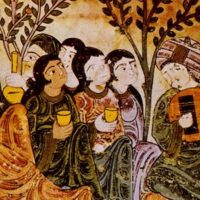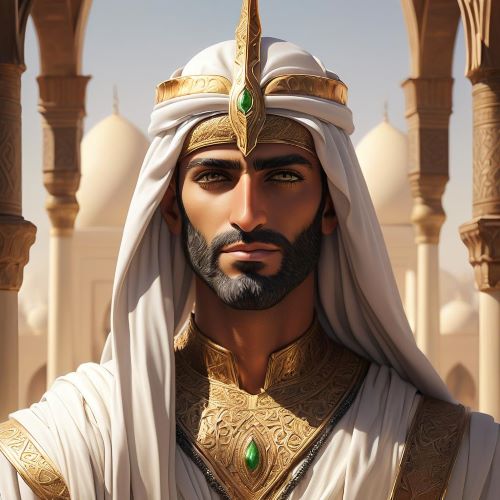Basamum : God of Healing
Listen
At a glance
| Description | |
|---|---|
| Origin | Arabian Mythology |
| Classification | Gods |
| Family Members | N/A |
| Region | Saudi Arabia, UAE, Oman, Yemen |
| Associated With | Healing, Medicine, Livestock |
Basamum
Introduction
Basamum, revered as a formidable entity, epitomizes the very essence of Arabian mythology, traversing the corridors of time with an aura suffused with enigma and authority. In the rich tapestry of pre-Islamic Arabian lore, where a myriad of deities once held sway over the vast deserts, Basamum emerges as a figure of unparalleled intrigue. While the annals of history overflow with tales of divine beings, Basamum’s presence remains veiled in obscurity, his myths and rituals whispered in hushed tones, shrouded in the mists of time.
Within the ancient sands of pre-Islamic South Arabia, Basamum held sway as a deity of significant reverence. His name, thought to stem from the proto-Arabic word ‘basam’, denoting balsam, hints at a profound connection to the healing arts of antiquity. As the fragrant balsam plant held sway over ancient medicinal practices, so too did Basamum, perhaps embodying the divine essence of health and well-being in the eyes of his worshippers.
Physical Traits
Regrettably, no known depictions of Basamum have surfaced through the annals of history. This absence of tangible imagery renders it challenging to ascertain with certainty the physical manifestation attributed to him. Scholars, delving into the depths of speculation, posit that given his purported link to healing, Basamum may have been envisioned as a benevolent presence, perhaps emanating an aura of warmth and vitality. However, the concrete physical attributes of Basamum remain elusive within the pages of historical texts. Like many deities of antiquity, depictions of Basamum likely varied across regions and cultures, reflecting the diverse interpretations woven into the fabric of ancient beliefs.
Yet, amidst the ambiguity, descriptions of Basamum’s form emerge from the whispers of myth and legend. Described as a towering figure robed in resplendent attire, Basamum commands reverence with a presence that transcends mortal comprehension. His countenance is said to radiate an ethereal luminescence, his eyes piercing the veil of time with the wisdom of epochs past. Tales speak of Basamum seamlessly shifting between mortal guise and celestial majesty, a testament to the boundless nature of his existence. Some accounts even depict him adorned with wings that span the horizon, symbolizing his celestial lineage and connection to both the heavens and the earth.
Family
Basamum’s familial connections remain shrouded in mystery within the available sources. However, the prevalent practice of deities being part of a pantheon in pre-Islamic Arabian mythology suggests a potential association with other revered figures worshipped in South Arabia. In the intricate tapestry of Arabian mythology’s familial bonds, Basamum emerges as a figure of ancestral significance. Depicted often as a descendant of the ancient gods, his lineage is traced through celestial bloodlines interwoven with mortal realms. Whispers of divine progenitors bestowing their essence upon Basamum echo through legend, endowing him with a mantle of power and responsibility, which he bears with grace and fortitude.
Despite his celestial heritage, Basamum embodies qualities of empathy and compassion, guiding mortals with a gentle touch and a heart tempered by empathy. However, akin to the elusive nature of his physical attributes, details surrounding Basamum’s familial lineage remain obscured. The fragmentary nature of available sources leaves a void in our understanding of his position within the divine hierarchy.
Other names
The name Basamum itself offers a tantalizing clue to his nature. It likely stems from the Proto-Arabic word “basam,” which translates to “balsam.” Balsam, a fragrant resin harvested from various plants, boasted medicinal properties in antiquity. This etymological link strongly suggests Basamum’s association with healing and health.
While Basamum is primarily known by his name, there are alternative titles attributed to him throughout Arabian mythology. In some regions, he is revered as Al-Malik al-Samad, the Eternal Sovereign whose wisdom guides even through darkness. Others invoke his presence through titles such as Al-Raheem, the Merciful, and Al-Qadir, the All-Powerful, highlighting his benevolent nature and limitless authority. These appellations serve as echoes of reverence, invoking the essence of Basamum across the diverse expanse of Arabian folklore.
Powers and Abilities
Basamum’s function finds its most compelling evidence in a singular inscription unearthed in southern Arabia. This ancient text recounts a tale wherein Basamum intervenes to cure two ailing goats or ibexes. Though this reference is sparse, it serves as a pivotal testament to Basamum’s purported role as a healer. The association of Basamum with healing and well-being implies a veneration of his curative prowess. Moreover, the ancient text’s depiction of Basamum mending the ailments of two animals—be they goats or ibexes—suggests a breadth of healing abilities extending beyond humanity to the animal realm as well.
Modern Day Influence
Although Basamum may not enjoy widespread recognition in contemporary culture, the examination of ancient deities akin to him yields invaluable insights into the beliefs and customs prevalent in pre-Islamic Arabian civilizations. Delving into the roles of deities such as Basamum aids modern scholars in deciphering historical manuscripts and relics, enriching our comprehension of human history. Basamum’s narrative, while not singular in the realm of pre-Islamic Arabia, reflects a broader pattern wherein numerous deities governed various facets of human existence, with healing emerging as a prominent motif. Deities like Atirat, associated with fertility and childbirth, and Dhu Shara, linked to rainfall and agricultural prosperity, underscore the significance attributed to addressing human needs and harmonizing with the natural environment.
Though Basamum’s personal saga remains fragmented, he occupies a vital place within the overarching narrative of Arabian mythology, shedding light on the profound emphasis placed on health and well-being in ancient societies. While the worship of Basamum waned with the ascendancy of Islam, echoes of his legacy endure, subtly resonating in the modern era. The persistent utilization of diverse balsam plants in traditional medicinal practices across the Middle East and beyond could be interpreted as a lingering homage to Basamum’s association with healing and vitality.
Related Images
Frequently Asked Questions
What is lorem Ipsum?
I am text block. Click edit button to change this text. Lorem ipsum dolor sit amet, consectetur adipiscing elit. Ut elit tellus, luctus nec ullamcorper mattis, pulvinar dapibus leo.
What is lorem Ipsum?
I am text block. Click edit button to change this text. Lorem ipsum dolor sit amet, consectetur adipiscing elit. Ut elit tellus, luctus nec ullamcorper mattis, pulvinar dapibus leo.
What is lorem Ipsum?
I am text block. Click edit button to change this text. Lorem ipsum dolor sit amet, consectetur adipiscing elit. Ut elit tellus, luctus nec ullamcorper mattis, pulvinar dapibus leo.
What is lorem Ipsum?
I am text block. Click edit button to change this text. Lorem ipsum dolor sit amet, consectetur adipiscing elit. Ut elit tellus, luctus nec ullamcorper mattis, pulvinar dapibus leo.
What is lorem Ipsum?
I am text block. Click edit button to change this text. Lorem ipsum dolor sit amet, consectetur adipiscing elit. Ut elit tellus, luctus nec ullamcorper mattis, pulvinar dapibus leo.









